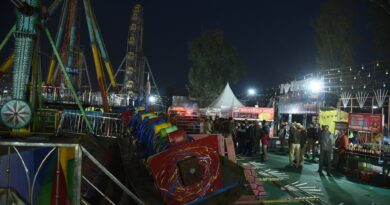‘Calculated Attempt to Silence Dissent’: SC Allows Amendments in Plea Challenging Activist Sonam Wangchuk’s NSA Detention
Wangchuk’s wife Gitanjali Angmo accuses authorities of procedural violations and pre-election targeting, denies any link to September violence in Ladakh
NewsArc Legal Desk
October 29, 2025 | New Delhi
In a sharp critique of the National Security Act (NSA) invoked against climate activist Sonam Wangchuk, his wife Gitanjali Angmo urged the Supreme Court on Wednesday to “vitiate” his ongoing detention, terming it a “calculated attempt” to muzzle democratic dissent amid procedural lapses and a barrage of pre-election probes.
Angmo, filing an application to amend her writ petition challenging Wangchuk’s arrest on September 26, 2025, highlighted “grave and incurable procedural lapses” under the NSA, including a 28-day delay in supplying the full grounds of detention—far exceeding the five-day statutory limit under Section 8. The amendments also deny any evidence linking Wangchuk to the violence on September 24, 2025, in Leh, where four protesters were killed in police firing, and portray his targeting as politically motivated ahead of elections and key dialogues on Ladakh’s autonomy.
A bench of Justices Aravind Kumar and N V Anjaria allowed the amendments, granting Angmo one week to file the updated petition. “Having regard to the averments in the application, the same is allowed,” the court noted, directing respondents to file counter-affidavits within 10 days, with rejoinders due a week later. The matter is now listed for hearing on November 24.
Wangchuk, a renowned innovator and environmentalist from Ladakh, has been lodged in Jodhpur Central Jail since his detention under the NSA, which allows for up to two years of preventive custody without trial. His activism centers on grassroots education, sustainable development, and advocating for Ladakh’s protections under the Sixth Schedule of the Constitution, following its bifurcation from Jammu and Kashmir in 2019.
#### Procedural Violations and Timeline Breach
Angmo’s plea underscores a cascade of alleged irregularities. The complete detention grounds were furnished only after 28 days, she argued, rendering the order “fatally defective” and warranting immediate release. “The continued detention… should be vitiated on account of the grave and incurable procedural lapses,” the application states, emphasizing that mandatory safeguards—intended to prevent arbitrary executive overreach—were flouted.
This comes against the backdrop of Wangchuk’s ongoing non-violent hunger strike, which entered its 15th day on September 24. The plea details how, upon learning of the unrest near the Hill Council Office, Wangchuk and Apex Body Leh (ABL) leaders, including Chairman Thupstan Chhewang and Co-Chairman Tsering Lagruk, rushed to de-escalate the situation. “Mr Sonam Wangchuk was not present at any place where the violence took place… As soon as he found out about the violence, he immediately tried to curtail the violence,” it asserts, refuting any causal link to his statements or actions.
No “provocative statements” by Wangchuk preceded the incident, the plea adds, with initial gatherings at the protest site featuring prayers led by monks and speeches by ABL members—none involving the activist directly.
#### Pre-Election Targeting and Broader Crackdown
Angmo’s amendments paint a picture of orchestrated harassment to sideline Wangchuk ahead of crucial elections and final-round talks between the ABL, Kargil Democratic Alliance (KDA), and the Ministry of Home Affairs. Just two months prior, he faced a flurry of actions: notices for land lease and FCRA cancellations, a CBI investigation probe, and Income Tax summons.
“It is wholly preposterous that after over three decades of being recognized… for his contributions… Mr Sonam Wangchuk would suddenly be targeted,” the application contends. These moves, timed in “close temporal proximity,” betray “not… genuine concerns of public order or security but… a calculated attempt to silence a respected citizen exercising his democratic and constitutional right to dissent.”
The plea categorically denies that Wangchuk has ever acted “prejudicial to the maintenance of public order or the security of the Union Territory of Ladakh,” positioning his detention as an assault on constitutional freedoms.
#### Implications for NSA and Dissent in Ladakh
Wangchuk’s case has amplified concerns over the NSA’s misuse against activists, journalists, and protesters, particularly in sensitive border regions like Ladakh. His indefinite fasts and campaigns have spotlighted ecological threats from unchecked development and the erosion of local safeguards post-Article 370’s abrogation. Supporters view the detention as emblematic of a broader clampdown on Ladakhi voices demanding autonomy and environmental justice.
As the Supreme Court delves deeper into the amended petition, the outcome could set precedents on NSA compliance and the boundaries of preventive detention. For now, Wangchuk remains in custody, his voice amplified through legal channels and global advocacy.



